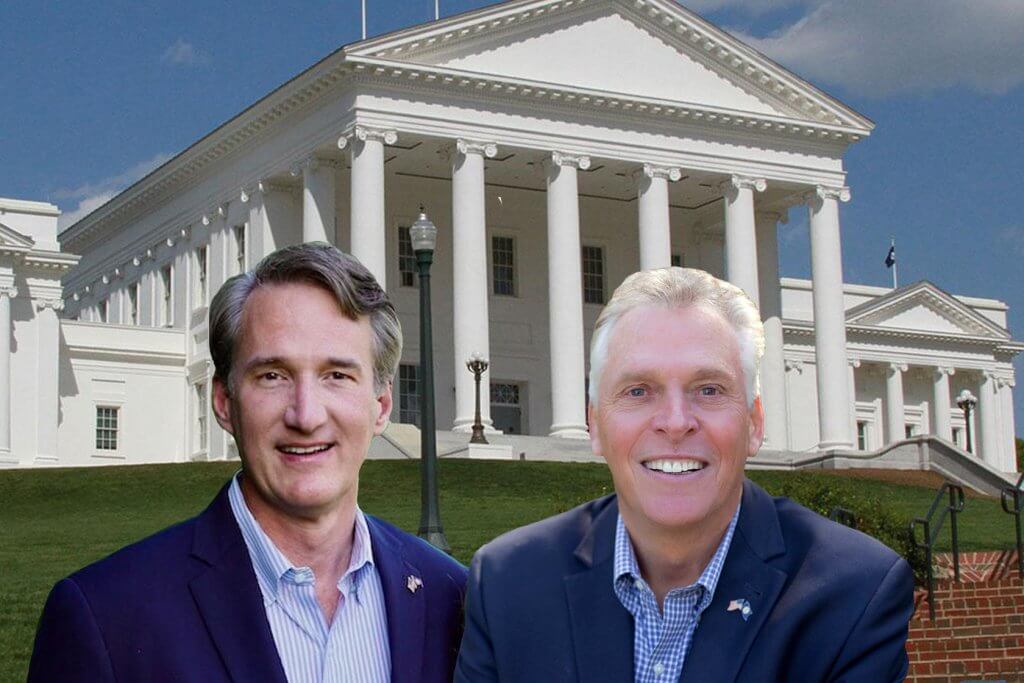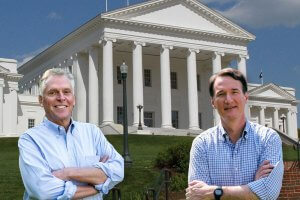West Long Branch, NJ – Democrat Terry McAuliffe maintains a small lead over Republican Glenn Youngkin according to the latest Monmouth (“Mon-muth”) University Poll of the Virginia governor’s race. There has been very little movement in the race over the past month, but there is some potential volatility among voters in the central part of the commonwealth. Overall, McAuliffe holds an advantage on handling issues that are priorities for a great number of voters, particularly the pandemic.
Just under half (48%) of registered voters currently support McAuliffe while 43% back Youngkin. This is virtually unchanged from the Democrat’s 47% to 42% lead in Monmouth’s August poll. McAuliffe continues to have an advantage among voters of color – 83% to 3% among Black voters and 53% to 28% among Latinos, Asians, and multiracial voters. Youngkin holds a large 57% to 36% lead among white voters, but there is a split based on education. His lead with this group is largely due to white voters without a bachelor’s degree (66% to 28% for McAuliffe). White college graduates prefer McAuliffe (50% to 43% for Youngkin).
Looking at regional support, McAuliffe enjoys a large advantage in Northern Virginia (58% to 29%) and the eastern Tidewater region (56% to 34%). The Democrat’s 29-point NoVa lead is identical to his 29-point lead there in August (56% to 27%) while his 22-point Tidewater lead is up from 13 points (50% to 37%). Youngkin has a 24-point lead in western Virginia (58% to 34%), which is similar to his 30-point lead there last month (61% to 31%). Support in the central part of the commonwealth along the I-95 corridor has flipped. Youngkin holds a 51% to 40% edge in this region, whereas McAuliffe had a 53% to 43% lead there in August. Four years ago, incumbent Gov. Ralph Northam won NoVa by 35 points (67% to 32%), the Tidewater area by 13 points (56% to 43%) and the central region by 9 points (54% to 45%), while losing western Virginia by 23 points (38% to 61%).
“The central spine around Richmond appears to be the area with the greatest potential for actually swaying voters. Throughout most of Virginia, though, it’s more a matter of turning out the respective party’s bases,” said Patrick Murray, director of the independent Monmouth University Polling Institute.
A range of potential electorate scenarios* shows McAuliffe ahead by anywhere from 3 points (48% to 45%) to 7 points (50% to 43%) depending on the likely voter model. Youngkin does better when more low-propensity voters are included in the mix. Specifically, McAuliffe has a lead among voters who have cast ballots in every general election since 2016 (51% to 44%) and those who participated in 4 of the last 5 general elections (49% to 43%). Among those who voted in only 2 or 3 elections and are considered less reliable voters, the race is much closer (44% for McAuliffe and 42% for Youngkin).
When the potential electorate is limited to voters who cast ballots in the 2017 gubernatorial election, McAuliffe holds a 51% to 43% margin, which is nearly identical to the winning Democratic margin that year. Youngkin does have an advantage among voters who describe themselves as being more enthusiastic about this year’s race compared to past gubernatorial elections. The Republican nominee has a 57% to 40% lead among this group, which makes up 33% of all registered voters.
“Youngkin seems to do better if the turnout is unusually high, while McAuliffe does better if turnout is just slightly above average for a gubernatorial race. Youngkin has an enthusiasm advantage, but the problem with enthusiasm is that it’s not always a good barometer for turnout, particularly when early voting and mail balloting options make it easier for less engaged voters to turn out,” said Murray.
| VIRGINIA: ELECTORATE SCENARIOS | ||||
| Governor vote choice: | Registered voters | Range of electorate models | ||
| September | ||||
| McAuliffe | 48% | 48% | 50% | |
| Youngkin | 43% | 45% | 43% | |
| August | ||||
| McAuliffe | 47% | 47% | 49% | |
| Youngkin | 42% | 45% | 42% | |
| Source: Monmouth University Poll, Sep. 22-26, 2021 | ||||
Monmouth’s August poll found Virginia voters have a wide range of policy concerns, but when asked in the current poll to choose the most important consideration from a list of seven policy areas, no single issue emerges. The top issues chosen as either a first or second choice for the most important factor in Virginians’ vote for governor are jobs and the economy (39%), the Covid pandemic (32%), and education and schools (31%).
Among these top three issues, McAuliffe has a clear advantage on being trusted more to handle the pandemic (41% to 28% for Youngkin) and a smaller edge on handling education and schools (37% to 33% for Youngkin). Virginia voters are evenly divided as to whether they trust Youngkin (36%) or McAuliffe (35%) more when it comes to jobs and the economy. These results are largely unchanged from last month.
The poll also finds that Virginia voters seem more aligned with the Democrat than the Republican on key pandemic policy positions. Specifically, 6 in 10 support reinstating face mask and social distancing guidelines (62%) and having a statewide Covid vaccine requirement for people in certain professions, such as health care workers and school teachers (59%).
McAuliffe also has an issue advantage on handling abortion (40% to 32%) and race relations (39% to 28%). Youngkin has a trust edge on handling police and law enforcement issues (39% to 33%) and taxes (37% to 33%). Each of these policy areas is a top-two concern for about 1 in 5 voters.
“McAuliffe has the edge on issues that are important to a greater number of voters than Youngkin does. This is true in each of the likely electorate models we examined as well as among all registered voters,” said Murray.
The major party nominees earn similar personal ratings from Virginia voters – 40% favorable to 33% unfavorable for McAuliffe and 40% favorable to 31% unfavorable for Youngkin. About 3 in 10 voters (29%) say McAuliffe’s political views are in line with most Virginians and 24% say he is out of step, while 48% are not sure. For Youngkin, 24% say his views are in line with the state and 25% say they are out of step, while 51% are not sure. These results are largely unchanged from Monmouth’s August poll.
“Despite a televised debate and a slew of campaign advertising over the past month, the needle has barely moved on how Virginia voters view these two candidates,” said Murray.
The Monmouth University Poll was conducted by telephone from September 22 to 26, 2021 with 801 Virginia registered voters. The question results in this release have a margin of error of +/- 3.5 percentage points. The poll was conducted by the Monmouth University Polling Institute in West Long Branch, NJ.
* Monmouth’s electorate models for the 2021 election are not forecasts. They are designed to present a range of reasonable outcomes based on voter intentions at this moment. Monmouth tests a variety of models where each registered voter is assigned a probabilistic weight between 0 and 1, based primarily on past voting history, with adjustments for self-reported likelihood to vote, motivation and other factors. Further adjustments are applied to the aggregate sample based on turnout propensities among different demographic groups (e.g. by race, gender, education). The two scenarios included in this report show the extreme ends of the range of possible outcomes from the model testing.
QUESTIONS AND RESULTS
(* Some columns may not add to 100% due to rounding.)
1.If the election for governor was today, would you vote for Glenn Youngkin the Republican, Terry McAuliffe the Democrat, or some other candidate? [NAMES WERE ROTATED] [If UNDECIDED: If you had to vote for one of the following candidates at this moment, who do you lean toward – Glenn Youngkin or Terry McAuliffe?]
| TREND: REGISTERED VOTERS (with leaners) | Sept. 2021 | Aug. 2021 |
| Glenn Youngkin | 43% | 42% |
| Terry McAuliffe | 48% | 47% |
| Other candidate | 2% | 2% |
| (VOL) No one | 1% | <1% |
| (VOL) Undecided | 7% | 9% |
| (n) | (801) | (802) |
[QUESTIONS 2 & 3 WERE ROTATED]
2.Is your general impression of Glenn Youngkin very favorable, somewhat favorable, somewhat unfavorable, or very unfavorable, or do you have no opinion?
| TREND: REGISTERED VOTERS | Sept. 2021 | Aug. 2021 |
| Very favorable | 22% | 18% |
| Somewhat favorable | 18% | 19% |
| Somewhat unfavorable | 11% | 9% |
| Very unfavorable | 20% | 18% |
| No opinion | 28% | 35% |
| (n) | (801) | (802) |
3.Is your general impression of Terry McAuliffe very favorable, somewhat favorable, somewhat unfavorable, or very unfavorable, or do you have no opinion?
| TREND: REGISTERED VOTERS | Sept. 2021 | Aug. 2021 |
| Very favorable | 21% | 20% |
| Somewhat favorable | 19% | 19% |
| Somewhat unfavorable | 9% | 12% |
| Very unfavorable | 24% | 23% |
| No opinion | 27% | 27% |
| (n) | (801) | (802) |
4.Which one of the following issues is most important to you in deciding your vote for governor? Which is the second most important? [ITEMS WERE ROTATED]
| REGISTERED VOTERS | FIRST CHOICE | SECOND CHOICE | COMBINED |
| The Covid pandemic | 18% | 14% | 32% |
| Jobs and the economy | 21% | 18% | 39% |
| Taxes | 9% | 11% | 20% |
| Education and schools | 14% | 17% | 31% |
| Race relations | 7% | 10% | 17% |
| Police issues | 9% | 11% | 20% |
| Abortion | 11% | 9% | 20% |
| (VOL) Other, none of these | 7% | — | 7% |
| (VOL) No answer | 2% | — | 2% |
| (n) | (801) | (801) | (801) |
[QUESTIONS 5 – 11 WERE ROTATED]
5.Who do you trust more on handling the Covid pandemic – Glenn Youngkin or Terry McAuliffe, or both equally? [NAMES WERE ROTATED]
| TREND: REGISTERED VOTERS | Sept. 2021 | Aug. 2021 |
| Glenn Youngkin | 28% | 26% |
| Terry McAuliffe | 41% | 38% |
| Both equally | 18% | 21% |
| (VOL) Neither | 5% | 7% |
| (VOL) Don’t know | 7% | 8% |
| (n) | (801) | (802) |
6.Who do you trust more on jobs and the economy – Glenn Youngkin or Terry McAuliffe, or both equally? [NAMES WERE ROTATED]
| TREND: REGISTERED VOTERS | Sept. 2021 | Aug. 2021 |
| Glenn Youngkin | 36% | 35% |
| Terry McAuliffe | 35% | 33% |
| Both equally | 20% | 21% |
| (VOL) Neither | 3% | 3% |
| (VOL) Don’t know | 6% | 8% |
| (n) | (801) | (802) |
7.Who do you trust more on race relations issues – Glenn Youngkin or Terry McAuliffe, or both equally? [NAMES WERE ROTATED]
| TREND: REGISTERED VOTERS | Sept. 2021 | Aug. 2021* |
| Glenn Youngkin | 28% | 26% |
| Terry McAuliffe | 39% | 35% |
| Both equally | 20% | 23% |
| (VOL) Neither | 5% | 6% |
| (VOL) Don’t know | 7% | 10% |
| (n) | (801) | (802) |
* August 2021 poll asked “Who do you trust more on race issues….”
8.Who do you trust more on education and schools – Glenn Youngkin or Terry McAuliffe, or both equally? [NAMES WERE ROTATED]
| TREND: REGISTERED VOTERS | Sept. 2021 | Aug. 2021 |
| Glenn Youngkin | 33% | 31% |
| Terry McAuliffe | 37% | 36% |
| Both equally | 21% | 21% |
| (VOL) Neither | 3% | 5% |
| (VOL) Don’t know | 6% | 8% |
| (n) | (801) | (802) |
9.Who do you trust more on issues involving the police and law enforcement – Glenn Youngkin or Terry McAuliffe, or both equally? [NAMES WERE ROTATED]
| REGISTERED VOTERS | Sept. 2021 |
| Glenn Youngkin | 39% |
| Terry McAuliffe | 33% |
| Both equally | 17% |
| (VOL) Neither | 5% |
| (VOL) Don’t know | 6% |
| (n) | (801) |
10.Who do you trust more on the issue of abortion – Glenn Youngkin or Terry McAuliffe, or both equally? [NAMES WERE ROTATED]
| REGISTERED VOTERS | Sept. 2021 |
| Glenn Youngkin | 32% |
| Terry McAuliffe | 40% |
| Both equally | 14% |
| (VOL) Neither | 4% |
| (VOL) Don’t know | 10% |
| (n) | (801) |
11.Who do you trust more on taxes – Glenn Youngkin or Terry McAuliffe, or both equally? [NAMES WERE ROTATED]
| REGISTERED VOTERS | Sept. 2021 |
| Glenn Youngkin | 37% |
| Terry McAuliffe | 33% |
| Both equally | 20% |
| (VOL) Neither | 4% |
| (VOL) Don’t know | 6% |
| (n) | (801) |
[QUESTIONS 12 & 13 WERE ROTATED]
12.Are Glenn Youngkin’s political views in line or out of step with most Virginians, or are you not sure?
| TREND: REGISTERED VOTERS | Sept. 2021 | Aug. 2021 |
| In line | 24% | 22% |
| Out of step | 25% | 23% |
| Not sure | 51% | 55% |
| (n) | (801) | (802) |
13.Are Terry McAuliffe’s political views in line or out of step with most Virginians, or are you not sure?
| TREND: REGISTERED VOTERS | Sept. 2021 | Aug. 2021 |
| In line | 29% | 29% |
| Out of step | 24% | 21% |
| Not sure | 48% | 50% |
| (n) | (801) | (802) |
[QUESTIONS 14 & 15 WERE ROTATED]
14.Do you support or oppose reinstituting face mask and social distancing guidelines in Virginia at the current time? [Do you support/oppose that strongly or somewhat?]
| TREND: REGISTERED VOTERS | Sept. 2021 | Aug. 2021 |
| Strongly support | 49% | 49% |
| Somewhat support | 13% | 15% |
| Somewhat oppose | 12% | 11% |
| Strongly oppose | 22% | 21% |
| (VOL) Don’t know | 4% | 4% |
| (n) | (801) | (802) |
15.Do you support or oppose having a statewide Covid vaccine requirement for people in certain professions such as health care workers and school teachers? [Do you support/oppose that strongly or somewhat?]
| REGISTERED VOTERS | Sept. 2021 |
| Strongly support | 51% |
| Somewhat support | 8% |
| Somewhat oppose | 9% |
| Strongly oppose | 27% |
| (VOL) Don’t know | 5% |
| (n) | (801) |
16.How will you vote this year – in person on Election Day, in person at an early voting location, or by mail ballot? [If ALREADY VOTED: How did you vote this year…?]
| TREND: REGISTERED VOTERS | Sept. 2021 | Aug. 2021 |
| In person on Election Day | 57% | 62% |
| In person at an early voting location | 24% | 20% |
| By mail ballot | 9% | 13% |
| Already voted in person | 3% | n/a |
| Already voted by mail | 2% | n/a |
| (VOL) Won’t vote at all | 1% | 1% |
| (VOL) Don’t know | 4% | 5% |
| (n) | (801) | (802) |
17.How motivated are you to vote in the election for governor – very motivated, somewhat motivated, or not that motivated?
| TREND: REGISTERED VOTERS | Sept. 2021 | Aug. 2021 |
| Very motivated | 76% | 74% |
| Somewhat motivated | 16% | 20% |
| Not that motivated | 8% | 5% |
| (VOL) Don’t know | 1% | 1% |
| (n) | (801) | (802) |
18.Compared to past elections for governor, are you more enthusiastic than usual, less enthusiastic, or about the same as past elections?
| TREND: REGISTERED VOTERS | Sept. 2021 | Aug. 2021 |
| More enthusiastic | 33% | 26% |
| Less enthusiastic | 8% | 8% |
| About the same | 57% | 63% |
| (VOL) Don’t know | 2% | 2% |
| (n) | (801) | (802) |
METHODOLOGY
The Monmouth University Poll was sponsored and conducted by the Monmouth University Polling Institute from September 22 to 26, 2021 with a statewide random sample of 801 Virginia voters drawn from a list of registered voters. This includes 225 contacted by a live interviewer on a landline telephone and 576 contacted by a live interviewer on a cell phone, in English. Monmouth is responsible for all aspects of the survey design, data weighting and analysis. The full sample is weighted for party primary voting history, age, gender, race, education, and region based on state voter registration list information and U.S. Census information (CPS 2018 supplement). Data collection support provided by Braun Research (field) and Aristotle (voter sample). For results based on the full voter sample, one can say with 95% confidence that the error attributable to sampling has a maximum margin of plus or minus 3.5 percentage points (unadjusted for sample design). Sampling error can be larger for sub-groups (see table below). In addition to sampling error, one should bear in mind that question wording and practical difficulties in conducting surveys can introduce error or bias into the findings of opinion polls.
VA Regions:
NoVa – Loudon, Fairfax, Arlington, and Prince William counties and included cities.
Tidewater – counties and cities along the Chesapeake Bay and tributary rivers (James, York, Rappahannock), including Hampton Roads, Virginia Beach, Newport News and Norfolk.
Richmond/I-95 – counties and cities that straddle either side of I-95, including Richmond.
West – the area west of a north-south line from Clarke/Fauquier to Mecklenburg counties.
| DEMOGRAPHICS (weighted) |
| REGISTERED VOTERS |
| Self-Reported Party ID |
| 30% Republican |
| 37% Independent |
| 33% Democrat |
| 48% Male |
| 52% Female |
| 21% 18-34 |
| 26% 35-49 |
| 29% 50-64 |
| 24% 65+ |
| 67% White, non-Hispanic |
| 19% Black |
| 6% Hispanic |
| 8% Asian/Other |
| 59% No degree |
| 41% 4 year degree |
Click on pdf file link below for full methodology and crosstabs by key demographic groups.




